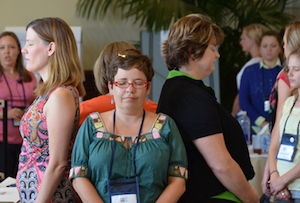
source
As an instructor and instructor teacher for over 10 years, I have had the benefit of working with a huge number of instructors. Presently, in my present limit as the executive of training at the Yale Center for Emotional Intelligence, an aspect of my responsibilities is supporting instructors from everywhere throughout the country in picking up, living, and showing social and enthusiastic learning (SEL), an arrangement of fundamental abilities that help individuals in encountering, overseeing, and communicating their feelings viably and in encouraging remunerating relational connections. All through these years working with instructors in different limits, I have been constantly roused by their devotion to supporting their understudies' scholarly, social, and enthusiastic development.
In the meantime, I have been seeing a tragic pattern among a portion of the instructors—and different professionals and researchers in the SEL field: When they portray how understudies of shading carried on before they partook in a SEL program, they tend to utilize words like "raucous," "confused," "separated," and "brutal," as though to feature the dire requirement for SEL programs for "these children."
At the end of the day, they outline SEL as a kind of deliverer—one that changes understudies of shading from being unmotivated, noisy, sluggish, and uninterested understudies into persuaded people all of a sudden eager about school and sufficiently calm to learn.
Undoubtedly, one may ponder what's off with an instructor depicting the power and capability of SEL programming in that way, particularly on the off chance that it is by all accounts working—and particularly if the educator implies well. Actually, we know from a 2011 meta-examination of 213 school-based projects that SEL guideline enhances understudies' social and enthusiastic aptitudes, dispositions, and practices and their scholarly execution.
Here's the issue: While stories about the effect of SEL may feel cheerful and inspiring to instructors, guardians, and others, they can likewise pass on unobtrusive messages that damage understudies inside and outside of the classroom.
Frequently, these stories propagate what University of Alabama teacher Latrise Johnson calls a "disappointment account," one proposing that adolescent of shading need SEL aptitudes more than other youngsters and that they would be in an ideal situation in the event that they would simply figure out how to identify with individuals better, oversee themselves all the more successfully, have more poise, and be more quiet. The outcome is that understudies of shading—and their instructors—disguise such understudies are innately lacking and needing an educator or some mediation to spare them from themselves.
The results can be desperate. Various investigations have just recommended that educators hold oblivious predispositions and generalizations about offspring of shading, driving them to train understudies of shading more cruelly than white understudies for a similar conduct. Understudies of shading start to trust these messages about themselves in ways that impact their social and scholarly working at school, as exhibited by look into on instructor desires and "generalization danger," which has discovered that when understudies of shading figure their execution on a test could be viewed as affirming a negative generalization about their capacity, they feel included pressure—which prompts the poor execution they were stressed over affirming in any case. What's more, investigate has likewise connected these same sorts of predispositions to the reiteration of heartbreaking police shootings of dark, Latino, and first-country individuals: Evidence proposes that oblivious inclinations against non-white faces make officers accept the most exceedingly bad and force the trigger all the more rapidly.
Along these lines, how we recount stories about our understudies matters, especially understudies of shading, who don't have to look too far to see negative pictures of themselves littered all through broad communications. As a dark teacher who grew up poor in the Bronx, I know how dehumanizing it can be to hear that young of shading need sparing and subduing. I am as yet handling my own particular inward difficulties around impostor disorder, and therefore, I'm especially delicate to the broad impacts that these stories can have.
However, from my encounters preparing a huge number of instructors around the nation, I know firsthand that most educators are extremely well meaning; they need to do ideal by their understudies.
I wholeheartedly trust we are equipped for holding our inclinations within proper limits and changing the stories we tell about understudies of shading. It is a procedure that requires some serious energy and duty—and in the event that you are an instructor prepared to focus on this work, here are four approaches to start.
- Watch how you recount stories
When sharing stories about your understudies, or tuning in to a partner discuss his or her understudies, consider whether the story speaks to the totality of a man or a people, or whether it debilitates them or propagates dangerous generalizations.
That is, is the story spreading a solitary account of offspring of shading being frightful, unmanageable, and uninterested in learning? Is the story certainly taking endlessly your understudies' organization in enhancing their own conditions—would you say you are exclusively their hero? Does the story talk about the societal and group settings that may add stressors to your understudies' lives, affecting their learning and conduct?
For instance, amid a class exchange in one of my instructor training classes, one of my educator understudies shared that his understudies, who were all understudies of shading, were not effective at school in light of the fact that (not at all like his previous secondary school cohorts and himself) his understudies did not have any desire to learn. He talked with such conviction, and as confirmation refered to the way that his understudies did not hear him out. The other 30 instructors in the room processed what he said as reality—that his understudies of shading were basically closed off—with the exception of one, the main educator of shading in the room.
Rather than making this reductive account about his understudies, which likely made him have low desires for them, he could have moved toward his showing quandary as a chance to look for criticism on his classroom rehearse from his kindred instructors, and to ponder ways that his guideline—and narrating—could accomplish more to regard and recognize his understudies' advantages, educational encounters, and setting.
That is, notwithstanding making the intelligent inquiries above, consider how you may educate more adjusted stories concerning understudies of shading. Spotlight on examining their deficiencies and difficulties as well as on featuring their qualities—what makes them lovely, strong, kind, and fascinating. By and large, this sort of "qualities based approach" prompts better results for understudies.
Additionally, know about whether you portray understudies of shading as "these children" or as "our children." Saying "these children" proposes a separation, a partition between your understudies and you—and this unpretentious move in dialect can speak to a noteworthy move in your reasoning and conduct towards them.
In entirety, the objective is to hold back—and to enable your associates to abstain—from likening tricky conduct with hazardous individuals and to underline understudies' qualities, not their shortfalls.
- Develop care to decrease oblivious inclination
source
It can be difficult to see when our words are sustaining unsafe generalizations about our understudies, particularly since those generalizations can be profoundly instilled in our cognizance.
Luckily, look into has recognized a powerful methodology for holding our oblivious predispositions within proper limits: care, the occasion by-minute familiarity with our contemplations, sentiments, and sensations.
Studies have discovered that care contemplation hones develop positive enthusiastic states toward others as well as decrease our automatic predispositions against certain social gatherings. Specifically, considers on adoring benevolence reflection, which incorporates examining and developing affection and empathy toward oneself as well as other people, have discovered that it expands social connectedness and lessens predisposition. This might be on the grounds that care subjects our oblivious predispositions and motivations to the investigation of our cognizant mindfulness.
Taking part in a short every day routine with regards to cherishing generosity reflection can possibly enable us to decrease inclination and associate all the more profoundly with our understudies and their groups. Beyond any doubt enough, a current analysis found that when educators got care preparing, they felt less focused and rushed to rebuff understudies.
- Develop more noteworthy consciousness of your energy and benefit
"Power is the capacity not simply to recount the tale of someone else, however to make it the conclusive story of that individual," as indicated by author Chimimanda Adichie. When recounting stories, it is useful to start asking the accompanying: Should I be the one recounting this story?
While sharing individuals' stories can here and there give them a more grounded stage from which to spread their work or thoughts all the more generally or recognize their achievements, we likewise chance quieting other individuals when we recount their stories for them. For one, when instructors share stories about their understudies, they may certainly assume acknowledgment for the triumphs of their understudies. When we do that, we put ourselves at the focal point of the story and strip the understudy of the chance to feature and completely claim his or her triumphs.
Narrating requires mindfulness, which includes thinking about how our character markers—sex, sexual introduction, religion, race, size, et cetera—position us on the planet and give us access to power and benefits, or not. Building this sort of mindfulness is a long lasting practice that requires genuineness, self-empathy, and profound reflection.
Creator and teacher Peggy McIntosh, a researcher on white benefit, traces some intelligent inquiries and practices that help winding up more mindful of the benefits a few of us are managed that others are most certainly not.
When we know about our energy and benefit, we are less lik



Nice content. Lot of hard work.
Thank you very much.
Congratulations @nishad-anowar! You have completed some achievement on Steemit and have been rewarded with new badge(s) :
Click on any badge to view your own Board of Honor on SteemitBoard.
To support your work, I also upvoted your post!
For more information about SteemitBoard, click here
If you no longer want to receive notifications, reply to this comment with the word
STOP